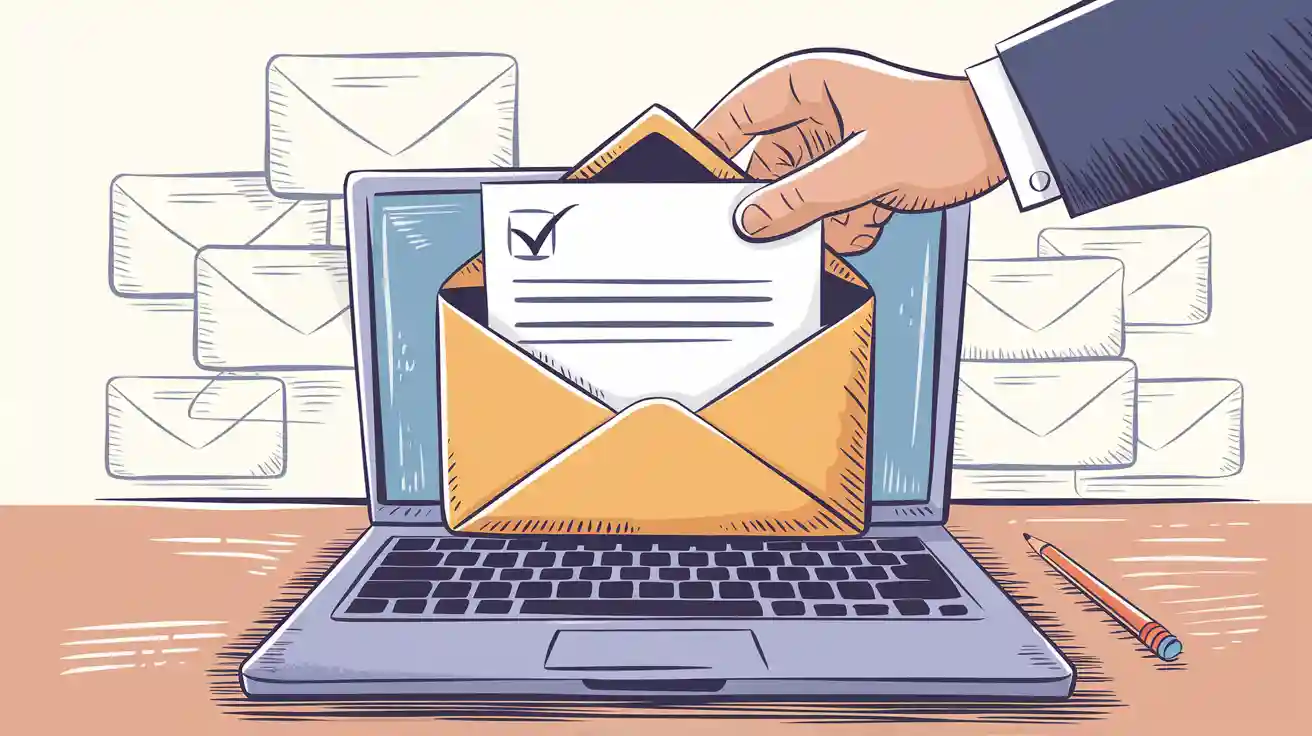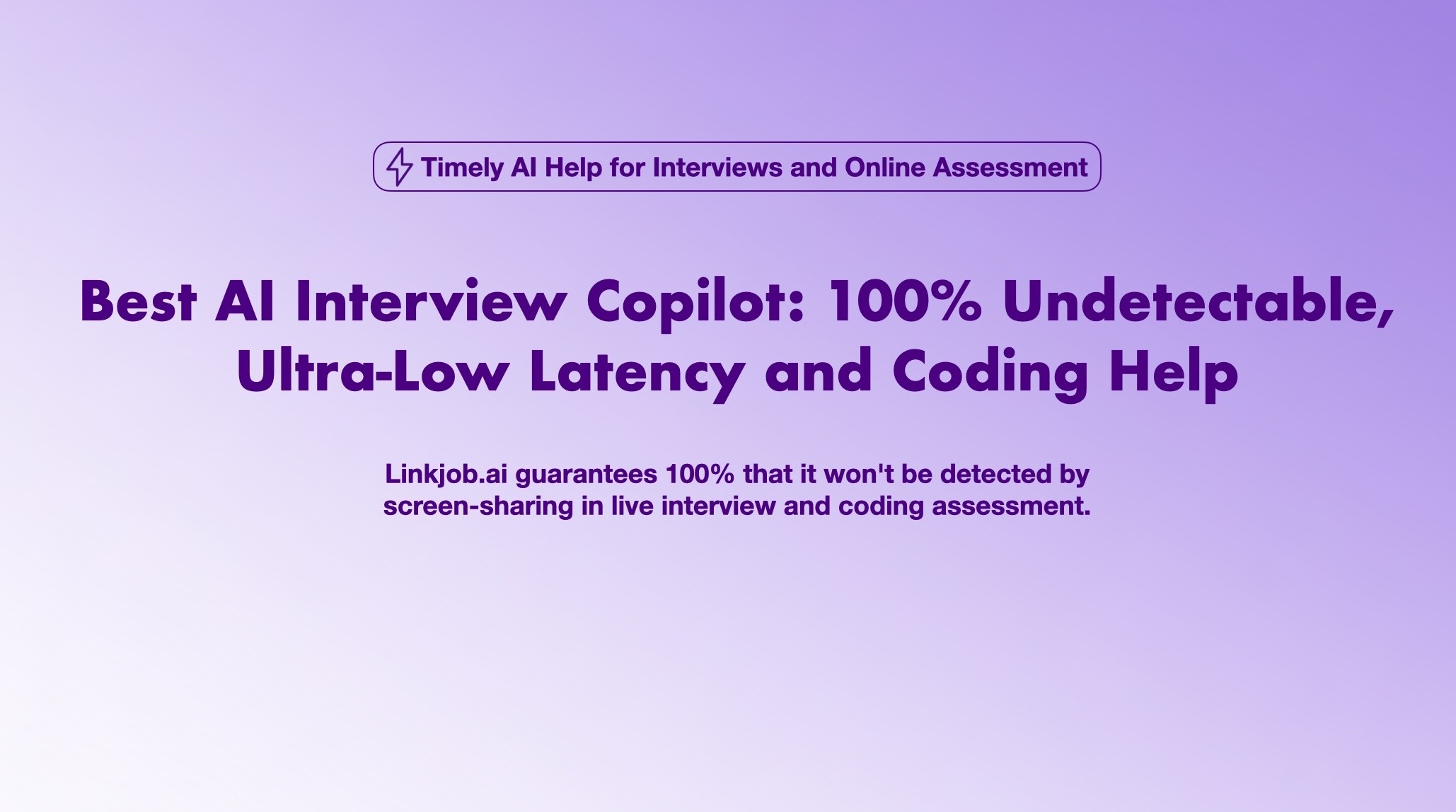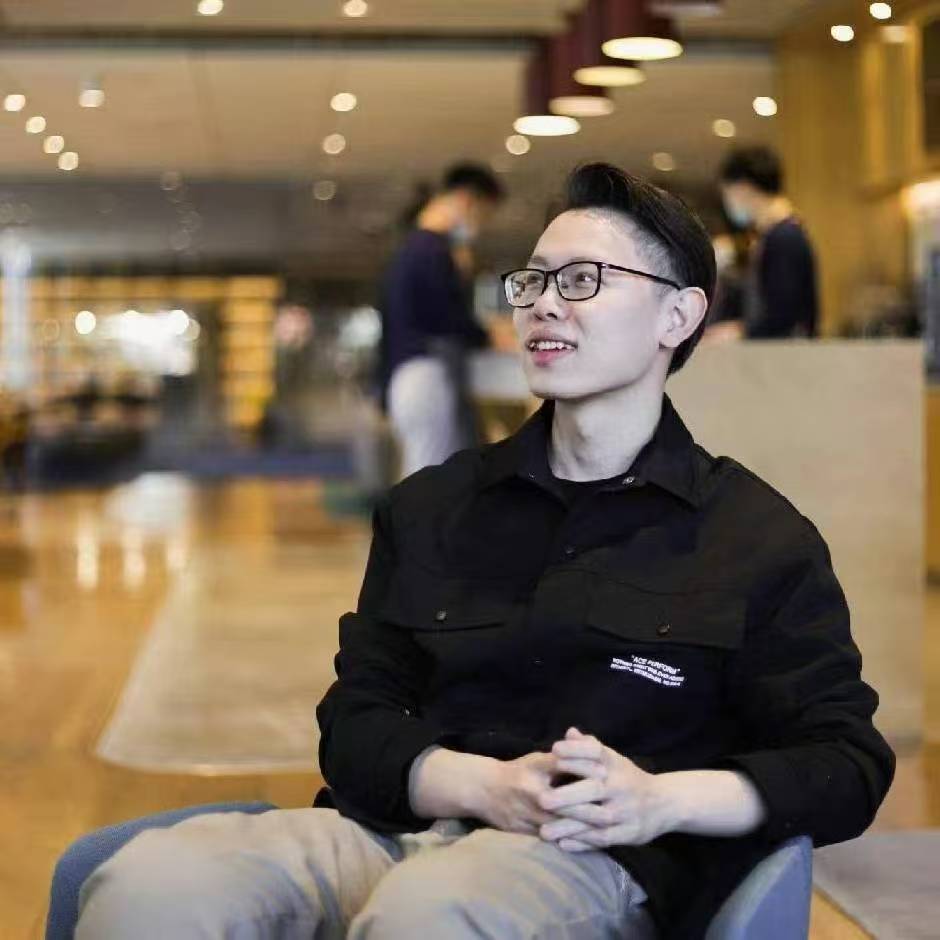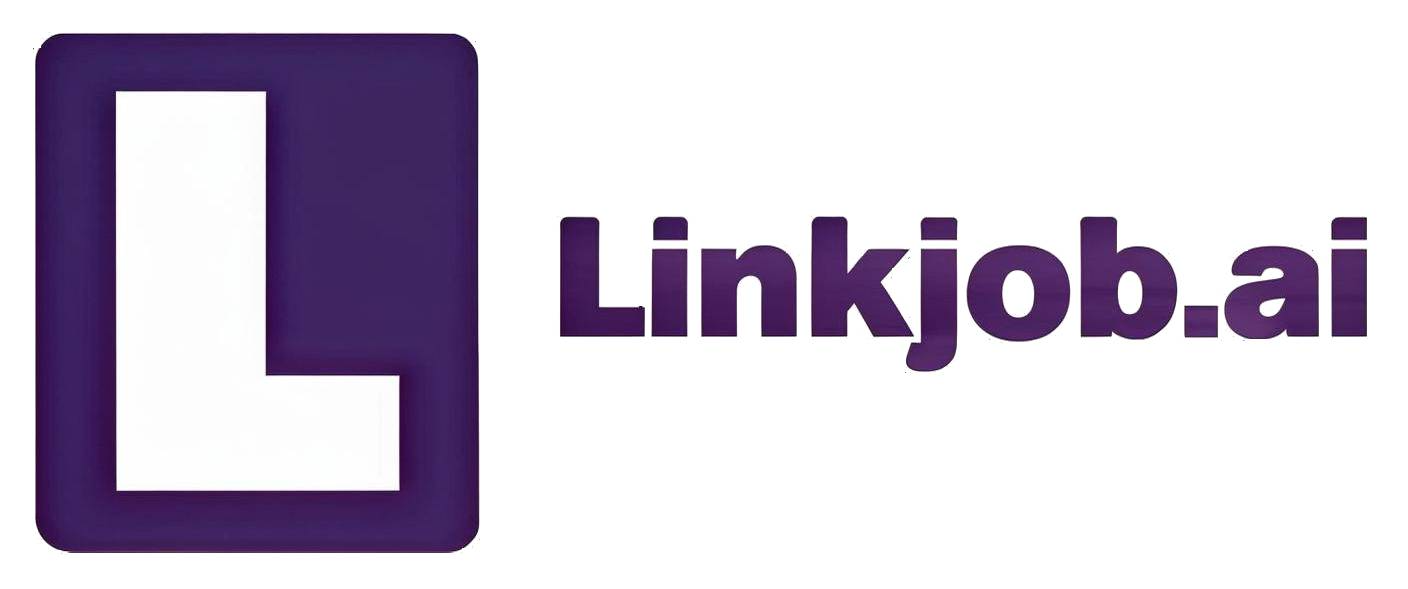How I Followed Up After Interviews and Got Replies with These Emails

I know how nerve-wracking the wait can feel after an interview. A well-timed, thoughtful follow-up makes all the difference. When I send an interview follow up email example that shows gratitude and initiative, I stand out from other candidates.
I have to say, Linkjob.ai is really incredibly useful. During the interview process, it's completely invisible—even if the interviewer requires screen sharing, the other party can't see at all that I'm using AI.
Interview Follow Up Email Example Templates
Sending a strong interview follow up email example can make all the difference. I have seen how a simple, well-timed message can boost my chances. In fact, Glassdoor reports that sending a thank‑you or follow‑up email after an interview can help you stand out and increase your chances of landing the job . I always keep my emails short polite and personal. Here are my go‑to templates for every situation.
First Interview
After my first interview, I want to show gratitude and remind them why I am a great fit. I send my thank-you within 24 hours. Here’s my favorite interview follow up email example for this stage:
Subject: Thank You for the Interview – [Job Title] at [Company Name]
Hi [Interviewer’s Name],
Thank you for meeting with me today about the [Job Title] position. I enjoyed learning more about [specific topic discussed] and your team’s approach at [Company Name]. I am excited about the chance to contribute my skills in [relevant skill/area]. Please let me know if you need anything else from me.
Thanks again,
[Your Name]
I always mention something specific from our conversation. This shows I paid attention and care about the role. Research shows that a personalized thank-you within 24 hours stands out and helps me stay top of mind.
Second or Final Interview
When I reach the second or final round, I want to reinforce my interest and highlight what I learned. Here’s the interview follow up email example I use:
Subject: Grateful for the Opportunity – [Job Title] Final Interview
Hi [Interviewer’s Name],
Thank you for the chance to discuss the [Job Title] role further. I appreciated hearing about [specific project, value, or challenge]. Our conversation made me even more excited to join [Company Name] and help with [specific goal or project]. Please let me know if you need any more information.
Looking forward to your decision,
[Your Name]
I keep it warm and confident. I mention a detail from the interview and restate my enthusiasm. This approach shows growth and continued interest, which hiring managers notice.
No Response
Sometimes I do not hear back after my interview. I know it feels awkward, but a polite check-in can make a difference. Here’s my go-to interview follow up email example for this situation:
Subject: Checking In – [Job Title] Interview Status
Hi [Interviewer’s Name],
I hope you are well. I wanted to check in regarding the [Job Title] position I interviewed for on [date]. I remain very interested in joining [Company Name] and contributing to your team. Please let me know if there are any updates or if you need more information from me.
Thank you for your time,
[Your Name]
I wait at least a week before sending this. I keep it friendly and never pushy. Studies show that timing and tone matter—a respectful follow-up can turn silence into a response.

Phone or Video Interview
After a phone or video interview, I want to confirm my interest and address anything we discussed. I use this interview follow up email example:
Subject: Thank You for the Phone Interview – [Job Title]
Hi [Interviewer’s Name],
Thank you for speaking with me today about the [Job Title] position. I enjoyed our conversation and learning more about [Company Name]. I am eager to bring my experience in [relevant area] to your team. Please let me know if you have any further questions.
Best regards,
[Your Name]
For phone or video interviews, best practices suggest sending a quick thank-you and offering to answer any follow-up questions. This keeps the door open and shows I am proactive.
Personal Touch
Sometimes I want to stand out by adding a personal touch. Maybe we bonded over a shared interest or discussed a unique challenge. Here’s how I personalize my interview follow up email example:
Subject: Thank You – [Job Title] Interview
Hi [Interviewer’s Name],
Thank you again for our conversation about the [Job Title] role. I enjoyed hearing about your experience with [shared interest or topic]. It made me even more excited about the possibility of joining [Company Name]. Please let me know if I can provide any more details.
All the best,
[Your Name]
I always keep it genuine. I mention something memorable from our chat. This helps me build rapport and makes my email stand out from the crowd.
Tip: I always proofread my emails and send them during business hours. A thoughtful follow-up not only shows professionalism but also helps ease the uncertainty that comes after an interview.
I have learned that using the right interview follow up email example at the right time can open doors. Strategic, well-crafted messages show I care, help me get feedback, and keep me in the running for the job.
Why These Emails Work
Professionalism
Sending a strong interview follow up email example can make all the difference. I have seen how a simple, well‑timed message can boost my chances. When I send a follow‑up email after an interview I show respect for the process and demonstrate that I value the interviewer’s time. A clear polite message tells the company I take the opportunity seriously. I always use a professional greeting thank the interviewer and keep my message short. This shows recruiters I pay attention to details and follow up promptly setting me apart from those who skip this step. According to Coursera experts, following up after an interview helps keep you on the hiring manager’s radar reinforces your interest and shows professionalism.
Personalization
Personalization makes my message memorable. I never send the same email to every company. Instead, I mention something specific from our conversation or highlight a shared interest. This small effort shows that I listened and care about the role.
When I personalize my interview follow up email example, I see better responses. Personalization works because it makes people feel seen and valued.
Demonstrating Interest
A follow-up email gives me a chance to show real excitement for the job. I use this moment to remind the interviewer why I am a great fit. I mention what I learned during our talk and how I can help the team. This extra step proves that I want the job, not just any job. When I show genuine interest, I build a stronger connection with the company. It helps me stand out and keeps me top of mind when they make a decision.
Writing Your Own Follow Up
Crafting my own follow-up email feels much easier when I break it down into steps. Here’s how I make sure my message stands out and gets noticed.
Timing
I always send my follow-up after the interview. This keeps my name fresh in the interviewer’s mind and shows I care about the opportunity. For most industries, Tuesday or Wednesday mornings work best. I avoid weekends and late nights because open rates drop during those times.
Industry | Best Day | Best Time |
|---|---|---|
B2B Services | Monday/Tuesday | 8-10 a.m. |
E-commerce | Tuesday/Thursday | 10 a.m. |
SaaS | Tuesday/Thursday | 2-3 p.m. |
Subject Lines
A strong subject line grabs attention. I like to use questions or mention something specific from the interview. For example, “Thank You for the Interview – [Job Title]” or “Following Up on Our Conversation.” Subject lines that spark curiosity or use the interviewer’s name get more opens. I sometimes A/B test different lines to see what works best.
Structure
I keep my emails short—usually five sentences or less. Google recommends being concise, clear, and professional. My typical structure looks like this:
Greeting
Thank you and mention of the position
Reference to a specific topic from the interview
Brief statement of continued interest or value I bring
Polite closing
Personalization Tips
Personalization makes my email memorable. I mention the interviewer’s name, the company, and a detail from our conversation. Personalized emails are less likely to be flagged as spam and get higher response rates. I sometimes add a helpful resource or a quick note about a shared interest. When I personalize my interview follow up email example, I see better results and build stronger connections.
Common Mistakes
Too Generic
I used to think any thank-you email would do the trick. I learned the hard way that generic follow-ups get ignored. When I send a message that could go to anyone, it feels cold and forgettable. Recruiters see hundreds of these every week. Generic emails lower engagement and even increase the chance of being marked as spam. Here’s what usually goes wrong:
I forget to mention the interviewer’s name or the company.
I skip over details from our conversation.
My message sounds like a template, not a real note.
Overly Demanding
I never want to sound entitled in my emails. If I demand a quick answer or act frustrated, I risk turning off the employer. Pushy follow-ups—like asking for an immediate response or sending too many emails—can hurt my chances. Here’s what I avoid:
Phrases like “I expect to hear back ASAP.”
Multiple emails in a short time.
Ignoring the company’s process or timeline.
By avoiding these common mistakes, I make sure my follow-up emails help me, not hurt me.
Real-Time Interview Success
Overcoming Nerves
I bring notes as prompts but avoid over-relying on them.
I calm myself before the interview.
I use a glass of water to pause and buy time.
I take natural pauses, breathe, and nod to collect my thoughts.
I repeat the question to refocus.
I avoid rambling and ask for clarification if needed.
I remind myself that the interview will end, which helps me relax.
Handling Unexpected Questions
Sometimes, interviewers throw questions I do not expect. When this happens, I stay calm and follow a simple plan:
I describe the unexpected situation or challenge.
I explain what I did to solve the problem.
I highlight the positive outcome and what I learned.
I keep my composure and show I can adapt.
I use open dialogue and listen carefully.
I focus on clear communication and empathy.
Linkjob AI Interview Assistant
I know that real-time support can make a huge difference during interviews. AI-driven tools now help candidates like me perform better and feel more confident. These tools also give candidates a better shot at success.
I use Linkjob as my AI Interview Assistant for both practice and live interviews. During a real interview, Linkjob listens to the conversation and instantly detects the interviewer’s question. It then gives me smart, context-aware answer suggestions right when I need them. This feature is especially helpful in tech and finance interviews, where questions can get complex fast. Linkjob helps me understand questions quickly, organize my thoughts, and deliver strong answers on the spot. I feel more composed and ready to tackle anything. With Linkjob, I get real-time support without feeling distracted, so I can focus on showing my best self.
What If You Could See the Right Answer—During the Interview?
Practice unlimited mock interviews with Linkjob to build confidence before the big day. Then, during your real online interview, get real-time answer suggestions and smart prep-notes to stay sharp and focused.
Quick Tips
Be Concise
I always remind myself that less is more when it comes to follow-up emails. Long messages can overwhelm the reader and hide my main point. I stick to the essentials. I focus on what matters most—gratitude, a specific detail from the interview, and my continued interest. If I can say it in five sentences, I do. Recruiters appreciate clear and direct communication. They often read dozens of emails each day. A short, focused note stands out and respects their time.
Tip: Before I hit send, I read my email out loud. If I stumble or get bored, I know it’s too long.
Proofread
Mistakes in my email can ruin a great first impression. I always take a minute to proofread before sending. I check for spelling errors, missing words, and awkward phrases. Sometimes, I use a tool like Grammarly or ask a friend to review my message. Reading my email from the bottom up helps me catch mistakes I might miss. I want my follow-up to show that I care about details.
I double-check names and job titles.
I make sure my sentences are clear.
I avoid slang or casual language.
Add Value
I look for ways to add value in every follow-up. I might mention a relevant article, share a quick idea, or offer to provide more information. This shows I am proactive and engaged. Even a small gesture can make my email memorable. I want the interviewer to see that I am thinking about how I can help their team. Sometimes, I reference something unique from our conversation or connect it to my skills.
Note: Adding value does not mean writing a long essay. One thoughtful sentence can make a big impact.
By following these quick tips, I make sure every interview follow up email example I send is clear, polished, and meaningful.
I know that sending a great follow-up email and mastering real-time interviews can set me apart. When I prepare, personalize my messages, and use smart tools like Linkjob, I feel ready for anything. I use the templates, watch out for common mistakes, and let technology boost my confidence. Ready to land your next job? Let’s go get that offer!
FAQ
How soon should I send my follow-up email after an interview?
I always send my follow-up email within 24 hours. This keeps me fresh in the interviewer’s mind. If my interview is on a Friday, I wait until Monday morning to send it.
What if I forgot to send a follow-up email?
I send it as soon as I remember. I apologize for the delay and still thank the interviewer. It’s better late than never.
Should I follow up if I have not heard back in a week?
Yes, I do. I send a polite check-in email after about a week. I keep it friendly and show continued interest in the role.
I avoid sounding impatient.
I ask if they need more information from me.
Can I use the same follow-up template for every interview?
I never use the same template for every job. I personalize each email with the interviewer’s name and a detail from our conversation. This shows I care and helps me stand out.

